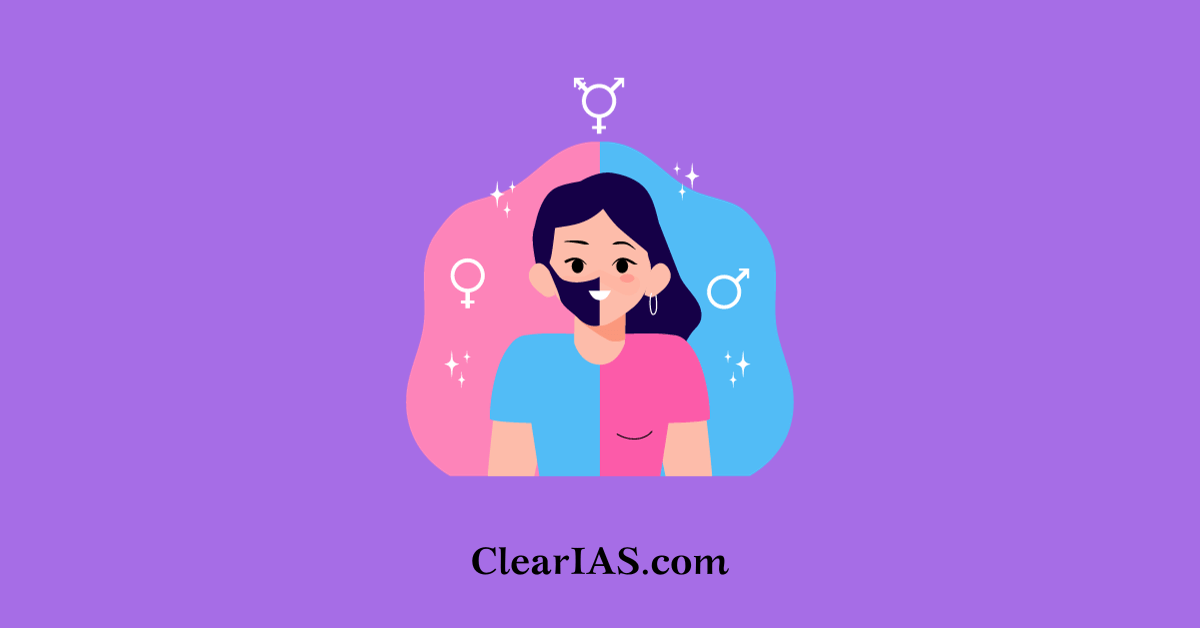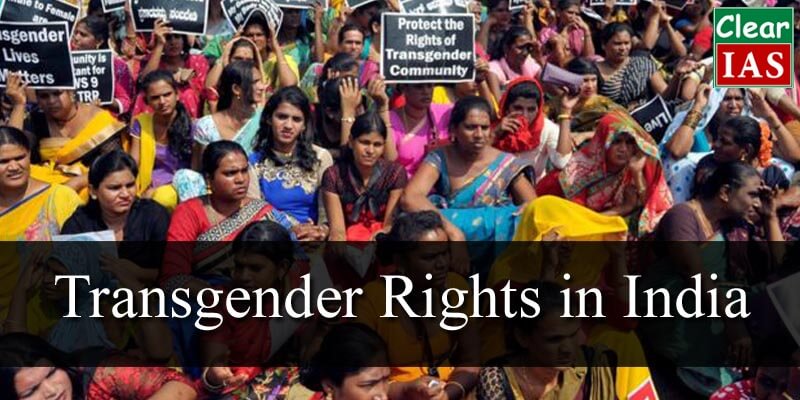
Transgender people are assigned a sex that isn’t true to who they are (reference: WebMD), and hence they face many social and psychological issues. In this post, let us analyse the need to give more importance to transgender rights.
Also read: Surrogacy: Regulation in India and the world
Who are Transgenders?

- The term ‘Transgender’ refers to those who don’t identify themselves completely with either of the dichotomous genders – male/female.
- The American Psychological Association and World Professional Association for Transgender Health define them as ‘people whose gender identity (sense of themselves as man or woman) or gender expression differs from that usually associated with their birth sex.
- This grouping constitutes a significant minority, estimated to be around 25 crores globally in number.
- They are non-heterosexual individuals.
What is the difference between Sex and Gender?
- The World Health Organization (WHO) has clearly demarcated the difference between these often interchangeably used terms.
- According to WHO, Sex refers to the biological and physiological characteristics that define men and women while Gender refers to the socially constructed roles, behaviour, activities and attributes that a given society considers appropriate for men and women (Reference: WHO).
Recognition of Transgender Rights: Case of Germany
- Recently, the German LGBT (Lesbian Gay Bisexual Transgender) populace sees the transition from persecution at the hands of Nazis to the legitimization of same-sex marriages.
- In a landmark gesture, the German Chancellor allowed other lawmakers to ‘vote their conscience’, despite her reservations towards the legislation (Note – This is a good instance to cite when arguing about reforms in Anti-Defection provisions of India. Parliamentarians, when deliberating and voting upon general policy oriented resolutions, must be bound by their conscience and not the Whip’s command).
- Germany had recognised same-sex couples as instances of civil partnerships in 2001. However, it took another 16 years to translate into the status of full-marital rights.
- With this Germany has joined the ranks of Spain, France, Britain, etc. in recognising marital rights to the vulnerable section.
What is the status of Transgenders in India?
- Transgenders do not enjoy a legal recognition in India like most of the Asian counterparts.
- However, some states like Tamil Nadu, Kerala and Odisha recognise transgenders as the third gender.
- The Transgender Persons (Protection of Rights) Bill, 2016, intended towards the protection of transgenders is yet to be passed.
- The Bill defines a transgender person as one who is partly female or male; or a combination of female and male; or neither female nor male. In addition, the person’s gender must not match the gender assigned at birth.
- The bill includes trans-men, trans-women, persons with intersex variations and gender-queers.
What has India done to cater to this grouping?
In NALSA v/s Union of India, 2014, Supreme Court (SC) of India rolled out a landmark judgment giving a framework for recognising the rights of transgenders. It stated:
- The right to choose one’s gender is part of the right to life and live with dignity – thus recognising the civil rights of this section.
- SC directed the government to include ‘third gender’ in all official documents/forms, thus recognising transgenders (excluding lesbian, gay and bisexual grouping) as the third gender.
- To choose from one of the three genders was mandated to be only the person’s choice.
- It also provided for avenues of reservation within the OBC quota to this ‘marginalised’ section (Note: In June 2016 Odisha became the 1st state to provide for social welfare benefits to transgenders, however, demands of reservation in government jobs and electoral seats are yet to be heeded to).
- It was suggested that a commission to protect rights of this community must be setup just like the National Commission for SC/STs.
- SC also gave a green signal to the Expert Committee Report prepared by the Ministry of Social Justice and Empowerment (MoSJE) (This report talked about the plight of transgenders in India and provided for identification, sex-reassignment procedures, legal protection, precautions to check exploitation, etc).
In Ram Singh v/s Union of India case, 2015, (famously known as the Jat Reservation case) SC while quashing attempts of granting reservation to Jat groups in nine states stated:
- Reservation solely on the basis of caste must be discouraged, and affirmative actions must be provided to those who are the most deserving.
- There is a need to come up with new criteria for reservation.
Thus, NALSA case and later the Ram Singh v/s UoI case laid down the groundwork for the government to follow in spirit (both were welcome judgments).
Also read: Surrogate Advertisement
Legislative actions towards the protection of transgenders: Transgender Rights Bill

Earlier Rajya Sabha has passed a bill named The Transgender Persons Bill, 2014. However, currently, a modified version of the same has been introduced by the government as The Transgender Persons (Protection of Rights) Bill 2016 and is pending before the house.
Journey of the Transgender Rights Bill so far
- The original draft of The Transgender Persons Bill was passed in Rajya Sabha as a private member bill in 2014.
- In 2015, The Central Government brought its own bill, through borrowing from the original draft.
- The 2015 draft did away with the provision for special commissions for transgenders and the transgender rights court proposed in 2014 bill.
- Later, after due consultations and public discourses, the final version of the draft was brought in August 2016.
- It is opinioned by experts that this version is an even more watered down version than the 2015 draft. According to them, it is disregarding NALSA judgment, Expert committee report as well as the public comments.
Concerns about the Transgender Rights Bill
1. Definition of Transgender
- The definition in the Clause 2(i) is inspired from Australian Sex Discrimination Act, 2013, which defines ‘intersex’. As stated above, gender must be distinguished from sex. It is not done in the bill.
- Expert Committee Report had already discussed the differences between the two
2. Right to choose a gender
- In NLSA case, SC had directed the choice to be that of an individual – this has not been considered in this bill. Providing for a registration authority, in this case, a medical board opens avenues for red-tape and harassment.
- The 2015 bill had a better/more progressive definition of transgenders, allowing a choice of gender from amongst male/female/others.
3. Affirmative action
- No provision for reservation has been made in the bill.
- This clearly is a deviation from the SC directions in NLSA case and Jat reservation case.
- Not a rights-based approach.
- Unlike the recent ‘Rights of Persons with Disabilities Act, 2016’ and ‘Mental Health-care Bill, 2016’ which have taken an empathetic approach when dealing with the marginalised, the transgenders bill fails to draw the much-needed emotional connect with the transgenders. (Consider for instance the decision to decriminalise suicide in the Mental Health-care Bill. A victim will be thought of as mentally ill and therefore appropriately aided in such circumstances rather than being punished and alienated further.)
- On similar lines, there is a need to identify rights of transgenders within the Golden Triangle – Article 14, 19 and 21. Integrating the third gender is the way ahead.
4. Impact on existing laws/rules
- Criminal laws, especially related to sexual offences will have to be updated to bring them in-line with the acceptance of the third gender and therefore their sexual orientations.
- Marriage, adoption, succession rights must be guaranteed to them as well (Note: Adoption rights were already being enjoyed by transgenders at some places like Germany).
- Most of these laws are cisnormative (based on binary gender) and consequently require an overhaul to accommodate the trinity.
- For instance, countries like UK and Argentina have addressed this concern in their laws. India must follow their precedent in this regard.
5. IPC – Section 377
- Embracing rights of persons with non-conforming genders while criminalising persons with non-conforming sexual orientations is absurd.
- This is even more surprising when the safeguards are given in place to check child-molestation, sexual abuse by means of laws like POCSO Act (Prevention of Children from Sexual Offences).
Way forward
- Taking a cue from our western counterparts like UK, France and Germany, we must harmonise our laws to reflect the ‘unity in diversity’ that we celebrate.
- The cultural and religious norms must not be a hurdle in empowering this minority.
- The NLSA and Ram Singh judgments and the ‘Expert Committee Report on Transgenders’ must serve as the guiding light in realising the true meaning of inclusive growth, and in doing justice to the slogan of Sabka Saath Sabka Vikas.
Read: LGBTQIA+ community; Intersex Rights
Article by: Shuja Shabir





I recently went through the article ‘Transgender Rights – Legal Recognition: The need of the hour’ by Shuja Shabir. I found it very insightful, well researched, thoroughly relevant, lucid and easy to understand.. I’m checking out more articles on the site now ☺
Thanks to ClearIAS team for the commendable work.
Keep it up!